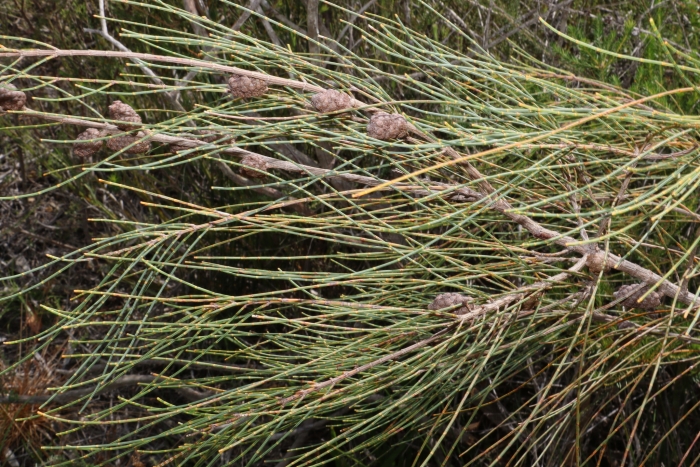Scrub She-Oak
(Allocasuarina distyla)
Scrub She-Oak (Allocasuarina distyla)
/
/

© Greg Tasney
CC BY-SA 4.0
Image By:
© Greg Tasney
Recorded By:
Copyright:
CC BY-SA 4.0
Copyright Notice:
Photo by: © Greg Tasney | License Type: CC BY-SA 4.0 | License URL: http://creativecommons.org/licenses/by-sa/4.0/ | Uploader: gregtasney | Publisher: iNaturalist |

























Estimated Native Range
Summary
Allocasuarina distyla, commonly known as Scrub She-oak, is a dioecious shrub native to heathlands and dry sclerophyll forests on sandstone ridges in southeastern New South Wales, Australia. It typically grows 3 to 10 feet tall and features smooth bark with erect branchlets up to 14 inches long. The foliage consists of reduced scale-like leaves arranged in whorls, which are an adaptation to its dry environment. The plant produces fruiting cones that are 0.5 to 1.4 inches long, containing winged seeds that facilitate dispersal by wind. Flowering occurs in spring, with male and female flowers on separate plants; the male flowers are small and not particularly showy, while the female cones are more noticeable once mature.
Scrub She-oak is valued for its ability to thrive in poor, sandy soils and its resilience to drought, making it a suitable choice for low-maintenance landscapes, coastal gardens, and restoration projects. It is also used as a windbreak and for erosion control due to its dense growth habit. In cultivation, it prefers full sun to part shade, well-drained soils, and can tolerate dry conditions once established. Hybrids with A. littoralis are common, which can sometimes be used to advantage in cultivation for their varied characteristics. Gardeners should be aware that Allocasuarina species can host the gall-forming Allocasuarina moth, which may cause aesthetic damage to the foliage.CC BY-SA 4.0
Scrub She-oak is valued for its ability to thrive in poor, sandy soils and its resilience to drought, making it a suitable choice for low-maintenance landscapes, coastal gardens, and restoration projects. It is also used as a windbreak and for erosion control due to its dense growth habit. In cultivation, it prefers full sun to part shade, well-drained soils, and can tolerate dry conditions once established. Hybrids with A. littoralis are common, which can sometimes be used to advantage in cultivation for their varied characteristics. Gardeners should be aware that Allocasuarina species can host the gall-forming Allocasuarina moth, which may cause aesthetic damage to the foliage.CC BY-SA 4.0
Plant Description
- Plant Type: Shrub, Tree
- Height: 1.5-6 feet
- Width: 1.5-3 feet
- Growth Rate: Moderate
- Flower Color: Red, Brown
- Flowering Season: Spring
- Leaf Retention: Evergreen
Growth Requirements
- Sun: Full Sun, Part Shade
- Water: Low
- Drainage: Medium, Fast
Common Uses
Bird Garden, Drought Tolerant, Erosion Control, Groundcover, Low Maintenance, Rock Garden
Natural Habitat
Heathlands and dry sclerophyll forests on sandstone ridges
Other Names
Common Names: Twisted She-oak, Scrub She-oak
Scientific Names: , Allocasuarina distyla, Casuarina distyla, Casuarina distyla var. prostrata, Casuarina dumosa, Casuarina dumosa, Casuarina stricta,
GBIF Accepted Name: